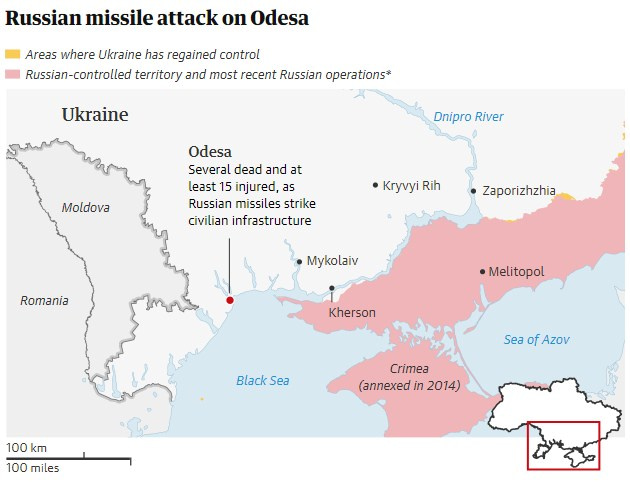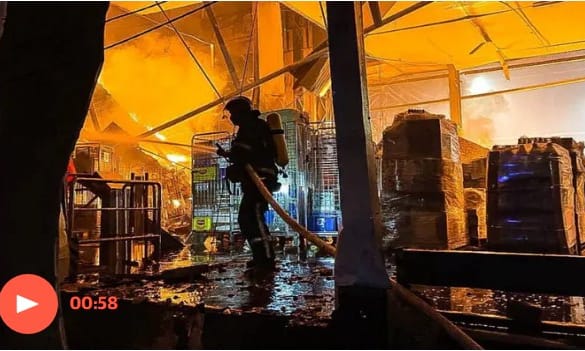Kyiv and western sources issue downbeat assessment as Moscow targets supply lines in Odesa with deadly cruise missile strike
Daniel Boffey in Kyiv
Ukraine: Russian missile attack kills three in Odesa – video
Kyiv has said its troops are battling under Russian “air and artillery superiority” as cruise missiles targeting the supply lines of the Ukrainian counteroffensive killed three people working a nightshift in a warehouse in the southern city of Odesa.
The country’s deputy defence minister, Hanna Maliar, said she could report just partial success over the last 24 hours, during which the progress of Ukraine’s forces had been measured only in the hundreds of metres as they sought to advance in the east and south.
Western officials added to the sombre tone as they briefed that Ukraine was taking significant casualties and making slow progress towards Russia’s main line of defence, in one of the west’s first assessments of the Ukrainian counteroffensive launched on 4 June.
“The Russian manoeuvre and defence approach is proving challenging for Ukraine and costly to attacking forces, hence the advance at the moment is slow,” an official said. They added that “grinding, costly warfare” was likely for many months to come.
“This is incredibly difficult,” the official said. “They are going against a well-prepared line that the Russians have had months to prepare.”
The downbeat assessments came as what was described as extremely fierce fighting spilled over again into Ukraine’s urban centres. Kalibr missiles hit Odesa at 2.40am on Wednesday, setting a warehouse, a business centre, an educational institution, restaurants and shops ablaze.
It was a one of a number of attacks across the country on Wednesday that left 13 civilians dead and 24 injured. The death toll from a strike on a warehouse and apartment block in Kryvyi Rih was also raised to 12 after the death of a 67-year-old man in hospital overnight.

Natalia Humeniuk, a spokesperson for Ukraine’s southern defence forces, said there was a pattern to the recent strikes.
“The missile attack on the Odesa region was apparently aimed at the objects sought by the enemy in the area of logistics support for the defence forces,” she said. “They have already begun active operations at the front. The same attack took place earlier in Kryvyi Rih.
“This is an area that the Russians interpret as an area of resources for the defence forces. They also attacked Odesa. They attacked a warehouse with water and consumer goods. They also hit a business centre. The Russians say: ‘We are hitting decision-making centres,’ so apparently for them it is a business decision-making centre.”
Andriy Yermak, the head of the office of the Ukrainian presidency, said Moscow’s liberal use of cruise missiles showed the need for a tightening of economic sanctions on Russia.
“The Russians shelled the city with Kalibr cruise missiles. Civilians died. Each of these missiles has at least 40 foreign components,” he said. “Without microelectronics, Russia will not be able to produce them. Sanctions must be strengthened, in particular against those who help the terrorist country to obtain components for weapons.”
Russia has been able to bypass western sanctions on key weapons components through the use of third countries.
The UK-based Conflict Armament Research organisation identified 144 European, Asian and US manufacturers last year whose components were ending up in advanced weapons such as Kalibr cruise missiles.

Kyiv has suggested that progress is being made in recent days in its long-anticipated counteroffensive, with 100 sq km said to have been liberated in recent days. Vladimir Putin, however, has said his forces have imposed “catastrophic” losses upon Ukraine’s military.
In a post on Telegram, Maliar said Ukrainian forces had advanced 200m to 500m in the region around Bakhmut and 300m to 350m south easterly in the Zaporizhzhia oblast on Wednesday.
“Our troops are moving in the conditions of extremely fierce battles, aviation and artillery superiority of the enemy,” she said, adding that Russia was also suffering heavy material losses. Sources suggested that only 10% of the Ukrainian reserve amassed for the renewed offensive was yet in play.
Rafael Grossi, the director general of the International Atomic Energy Agency, who met Ukraine’s president, Volodymyr Zelenskiy, on Tuesday, was forced to delay a scheduled visit to the Zaporizhzhia nuclear plant in Russian-controlled territory on Wednesday as a result of the fierce fighting in the oblast.
Grossi had earlier spoken of being “very concerned” that the nuclear plant could become embroiled in the counteroffensive, with particular anxiety caused by the recent damage done to the Kakhovka dam, which has led to a reduction in the water levels of a reservoir used to cool the facility.
In Odesa, one man, named only as Volodymyr, told local media that he had been with his wife and three-week-old daughter when a Kalibr missile hit near their apartment in the early hours of Wednesday.
“We were sleeping in our bedroom when we heard an explosion, all the windows were shattered, and we heard a loud screeching sound from the entire building,” he said. “Then we grabbed the baby and ran to the bathroom to be behind two walls. Only after that we realised that there were no windows, no doors, no idea what was happening.”
Belarus’s president, Alexander Lukashenko, said his country had started taking delivery of Russian tactical nuclear weapons, some of which he boasted were three times more powerful than the atomic bombs the US dropped on Japan in 1945.
Lukashenko, who said he would coordinate with Putin should the need arise to use nuclear weapons, said the warheads would be on Belarusian territory “in several days”, although there has been no independent verification of his comments.
He said: “We have always been a target. They [the west] have wanted to tear us to pieces since 2020. No one has so far fought against a nuclear country, a country that has nuclear weapons.”
